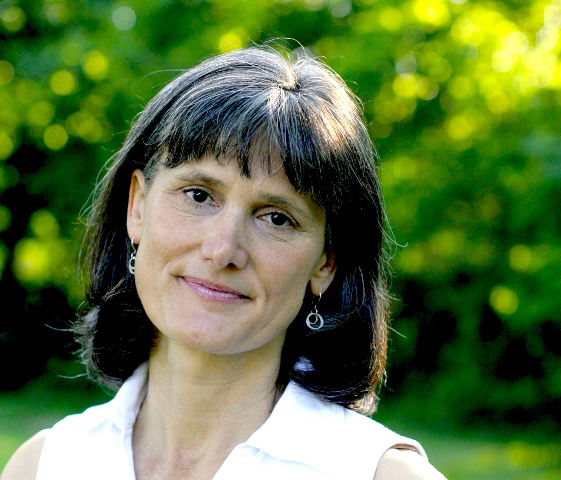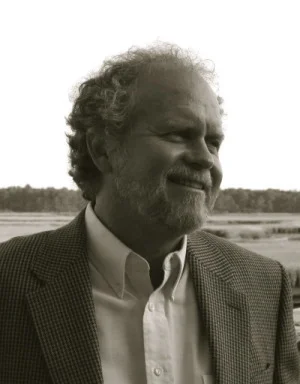For the next several months, we are privileged to publish articles from our friends at Blessed Earth. Their tireless work is to inspire and equip people to become better stewards of the earth by promoting measurable environmental change and meaningful spiritual growth. Caring for God's creativity is essential to living an artful, faithful life. For this reason and many more, I'm thankful and eager to share Blessed Earth with our readers. Enjoy this first of many articles.
—Charlie Peacock
A few years back, my husband was a well-respected physician at the top of his career — Director of Emergency Services and Chief of Medical Staff. He loved taking care of patients, and I loved caring for our family. We lived with our children, Clark and Emma, in a picture-perfect town in a three-story New England house, complete with a library, guest suite, and four bathrooms. Our kids took sailing lessons in the summer and skied in the winter. We ate lobster fresh from the wharf. We were enjoying the good life and living out the American dream.
But something was missing. We had all the nice things that were supposed to make us happy, yet at the core we still felt hollow.
Then, during the course of one week, Matthew admitted three different women to the hospital — all in their 30s, all with breast cancer, all destined to die. One woman seized uncontrollably, and Matthew could not stabilize her. He had to go out to the waiting room and tell her husband, who had a toddler on one hip and a little girl holding his hand, that his wife was gone. Matthew did what any compassionate doctor would do: he hugged the young dad, and they cried together.
That night, Matthew came home visibly upset. He said that it was time to stop “running for the cure” and start looking for the cause.
Around this time, we went on a family vacation to a barrier island off the coast of Florida. The island is idyllic — no cars, no roads, no stores — just sun, surf, and beautiful sunsets. After playing in the ocean all day and running around trying to catch geckos, the kids went to bed early, exhausted. Adult time at last! Matthew and I relaxed on the upstairs deck, watching the palm trees wave in a cool breeze and enjoying the silence of the stars.
We stayed like that, just sitting in the tropical moonlight, for a long time. I couldn’t help but compare the peacefulness of the night air with the busyness of our lives back home. So rarely did we have time to stop and think, to discuss the big questions of life. Our conversation rambled from art and music, to books we were reading, to the state of the world. And then I asked two questions that would change our lives forever.
And then I asked two questions that would change our lives forever.
“What do you think is the biggest problem facing the world today?”
I could just see the wheels whirling in Matthew’s head: Hunger? Poverty? War? AIDS? There was no shortage of potential answers.
After a few minutes, Matthew offered a reply that I was not expecting: “The world is dying.” The more we talked about the demise of the planet, the more depressing it all felt. The problems seemed so overwhelming.
That’s when I asked the second, more difficult, question.
“If the planet is dying, what are we going to do about it?”
What kind of crazy wife asks questions like that on vacation? But I’m glad I did. It changed our lives for the better. A couple of months later, my husband did get back to me on that second question — with an answer I wasn’t prepared to hear.
“I’ll quit my job,” he said, “and put all my energy toward saving the planet.”
“Are you sure we need to do that much?” I asked.
I had always thought of myself as a good environmentalist, but giving up a career that my husband clearly loved — as well as the prestige, steady income, and security that came along with it — to “save the planet”?
The thought terrified me. My stomach churned just thinking about what we might lose — our beautiful home, our harbor-side neighborhood, our vacations, not to mention health benefits and a retirement plan.
The selfish part of me began to whine: What about the three years of undergraduate school, four years of medical school, and three years of residency we had gone through together? Wouldn’t he be wasting all that training? And then there were practical concerns: The kids were approaching their teen years. College was just around the corner. How would we possibly save enough money to pay for their education if our income suddenly dropped to zero? How, for that matter, would we put food on the table?
Each of my arguments sounded logical on its own. In the material world, my husband’s sudden career change made no sense. Walking in faith may sound good in theory — that is, when it happens to other people and everything turns out okay in the end. But I was terrified to take the first step.
When we travel around the country sharing our story, people always ask, "What inspired you to change? Were there any arguments?" Of course! "How did the kids react?" Like teenagers! "What was the reaction from your family and friends?" Bewilderment.
The transition — as much emotional and spiritual as physical — took a couple of years. One of the very first things we did was to take inventory and measure our ecological footprint. When we actually calculated our total use of resources, we found ourselves exactly average for Americans: not bad for a physician’s family, since in general, the more income people have, the more resources they consume. Yet, we were clearly using more than our fair share on a global scale: six times more energy than our neighbors around the world!
Providentially, as we embarked on our environmental journey, we also began a faith journey. It seemed — at least to us — that the two were inseparable. Coming from two different faith backgrounds, Matthew and I began reading a range of sacred texts; all offered wisdom, but not the truths we were looking for.
One slow night in the hospital, Matthew picked up an orange Gideon’s Bible in the waiting room. He read through one of the Gospels. A light came on — here were the answers we had been seeking.
One by one, the whole family became believers. Suddenly, we had a clear purpose: to love God with all our heart, mind, soul, and strength, and to love our neighbors as ourselves. One way that we could show our love for the Creator, and for our global neighbors, was to start taking better care of the planet.
Over the next couple of years, we downsized our lifestyle, giving away half of our possessions and moving to a house the size of our old garage. Contrary to my earlier fears, we found that the more we “gave up” in material things, the more we gained in family unity, purpose, and joy. Eventually, through many small changes, we reduced our electricity usage and trash production by nine-tenths, and our fossil fuel usage by two-thirds. By gradually adjusting our thermostat, we saved more than a thousand dollars in heating and cooling bills. Hanging our clothes on the line, changing light bulbs, working from home, eliminating impulse purchases, and vacationing at state parks saved thousands more.
After we had our own house in order, we felt called to share our journey. Letters poured in from supporters who felt called to change but didn’t know where to start. Invitations to speak, preach, and lead workshops came from Washington, D.C., to Washington state, from every denomination and faith, from churches with ten members to tens of thousands. People were inspired to change; now they wanted to know how.
Caring for the earth is a journey. We can’t all do everything. But everyone can do something —beginning today.
Praxis:
• Adjust your thermostat by three degrees, and save 10 percent on your electricity bill.
• Install a low-flow shower head — they cost less than $10 and are as easy to install as a light bulb.
• Walk or bike someplace instead of driving; keep an errand list on the fridge and combine trips; check out public transportation options; or ask your employer if you can telecommute once a week.
• Spend at least five minutes in God’s world, where you can see nothing that is man-made — look up at the stars or down at a patch of grass.
• Stay at home this Sabbath. Don’t do anything except go to church, and park it the rest of the day.
Nancy Sleeth is an author, speaker, and co-founder of the faith-based environmental non-profit group, Blessed Earth. For more creation care resources and practical tips, visit www.blessedearth.org.

















